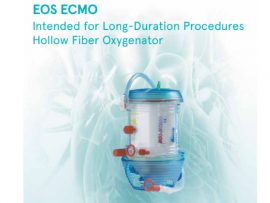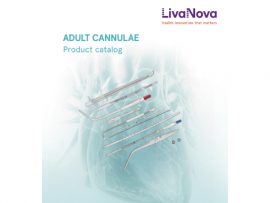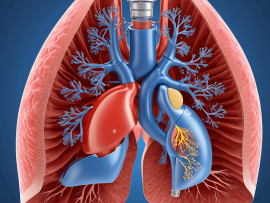Abstract Cardiogenic shock (CS) in patients with structural heart disease (SHD) and severe valvular abnormalities poses unique challenges to traditional mechanical circulatory support (MCS) strategies, such as intra-aortic balloon pumps..
Read MoreAbstract This study investigated factors influencing recirculation in veno-venous extracorporeal membrane oxygenation (VV ECMO) using a controlled bench model comprising a VV ECMO circuit and a mock circulatory loop with..
Read MoreAbstract BACKGROUND: Long-term outcomes and quality of life have been identified as core patient-centered outcomes for venoarterial extracorporeal membrane oxygenation (VA-ECMO) research. The aim of this study is to investigate..
Read MoreAbstract As survival after ECMO improves and use of ECMO support increases in both pediatric and adult population, there is a need to focus on both the morbidities and complications..
Read MoreAbstract Background Survival from refractory out of hospital cardiac arrest (OHCA) treated with conventional cardiopulmonary resuscitation (CCPR) remains low. Extracorporeal cardiac resuscitation (ECPR) is increasingly be utilised in refractory OHCA,..
Read MoreAbstract Background ECPR patients who receive guideline-compliant CPR will have improved survival to hospital discharge (SHD) compared to patients who do not receive guideline-compliant CPR, regardless of CPR duration. Methods..
Read MoreAbstract This study conducts an in-vitro experiment using a mock circulation system that mimics human circulation to assess the veno-arterial extracorporeal membrane oxygenation (ECMO) system. This study aims to compare the hemodynamic..
Read MoreAbstract Preterm birth remains the leading cause of mortality among neonates. Despite improvements in neonatal intensive care over the years, current treatments for lung and kidney failure are highly invasive,..
Read MoreAbstract Although venovenous (VV) extracorporeal membrane oxygenation (ECMO) is a life-saving intervention for trauma patients with severe respiratory failure, its mortality rate is 27%, and optimal metabolic markers for its..
Read MoreIntroduction Profound hypotension and end-organ hypoperfusion is most often a consequence of inadequate systemic blood flow from primary cardiac failure (cardiogenic shock) or hemorrhage (hemorrhagic shock). However, profound hypotension may..
Read MoreAbstract Extracorporeal membrane oxygenation (ECMO) is the most important support for patients with severe cardiopulmonary failure. As the key component, the oxygenation membrane has suffered the risk of blood coagulation..
Read MoreAbstract The use of extracorporeal membrane oxygenation (ECMO) in the paediatric population has increased over time, with the ability to rescue pulmonary and cardiovascular deterioration. ECMO can be utilised by..
Read MoreAbstract Objective: We aimed to characterize the impact of body mass index (BMI) on stroke in patients receiving extracorporeal cardiopulmonary resuscitation (ECPR). Methods: We queried the Extracorporeal Life Support Organization registry..
Read MoreAbstract Background Outcomes in cardiac surgery are influenced by surgical priority, with higher mortality in emergency cases. Whether this applies to postcardiotomy venoarterial (VA) extracorporeal membrane oxygenation (ECMO) remains unknown...
Read MoreAbstract Acute poisoning may lead to life-threatening conditions that require advanced life support, such as extracorporeal membrane oxygenation (ECMO). Data about the use of ECMO in intoxications and overdose are..
Read MoreAbstract Background Anticoagulation in pediatric extracorporeal membrane oxygenation (ECMO) presents unique challenges due to developmental hemostasis, coagulation factor production, and response to anticoagulants. This process requires close monitoring to prevent..
Read MoreAbstract Background: Patients who undergo extracorporeal cardiopulmonary resuscitation (ECPR) are at risk of left ventricular distention and complications. There is emerging evidence that concurrent mechanical left ventricular (LV) unloading (e.g...
Read MoreAbstract EXTRACORPOREAL MEMBRANE OXYGENATION (ECMO) is a potentially life-saving intervention often used in critically ill patients with severe respiratory or cardiac failure unresponsive to conventional treatments. As the prevalence of..
Read MoreAbstract Purpose: The evidence supporting the benefit on clinical outcomes of prone positioning during veno-venous extracorporeal membrane oxygenation (V-V ECMO) for acute hypoxemic respiratory failure remains inconclusive. We aimed to..
Read MoreAbstract Fever following decannulation from extracorporeal membrane oxygenation (ECMO) poses diagnostic challenges. While infectious causes and thrombosis are typically considered, rare etiologies may be overlooked. We report the case of..
Read MoreAbstract IN PATIENTS UNDERGOING bilateral lung transplant (BLT), the use of planned intra- and postoperative venoarterial extracorporeal membrane oxygenation (VA-ECMO) is increasing. It has become the standard practice in many..
Read MoreAbstract Background Veno-Arterial Extracorporeal Life Support (VA ECMO) is a critical intervention for patients with cardiogenic shock, serving as bridge to recovery, transplantation, or long-term therapies. The complexity of VA..
Read MoreAbstract In recent decades, multiple efforts have been made to reduce population exposure to cigarettes, given that smoking is responsible for thousands of deaths annually. These actions have been effective,..
Read MoreAbstract Objective: A standardized multifaceted approach to follow-up is crucial for monitoring neurodevelopment in neonates who undergo extracorporeal membrane oxygenation (ECMO). The Pittsburgh Index for Pre-ECMO Risk (PIPER+) score, which..
Read MoreAbstract Background Acute lower limb ischemia is a major complication of peripheral venoarterial ECMO, significantly impacting patient outcomes and survival rates. Traditional methods for assessing limb perfusion, such as physical..
Read MoreAbstract Clinical blood pump consoles for extracorporeal membrane oxygenation (ECMO) are poorly accessible to researchers due to their high cost. Furthermore, clinical machines are built and designed at a high..
Read MoreAbstract Purpose This study aimed to investigate the effects of different arterial cannula models on hemodynamic performance and blood damage associated with femoral artery cannulation in venoarterial extracorporeal membrane oxygenation..
Read MoreAbstract Background Extracorporeal membrane oxygenation (ECMO) is a medical intervention employed to provide life-sustaining support for patients. YouTube is a dynamic and widely utilized platform for distributing health-related information. The..
Read MoreAbstract Introduction Bleeding and thrombotic complications are common in extracorporeal membrane oxygenation (ECMO) patients and are associated with increased mortality and morbidity. The optimal anticoagulation monitoring protocol in these patients..
Read MoreAbstract Background Little is known about how the role of the extracorporeal membrane oxygenation (ECMO) specialist (ES) impacts intensive care unit (ICU) staff retention. Our facility allows staff ICU registered..
Read More


















